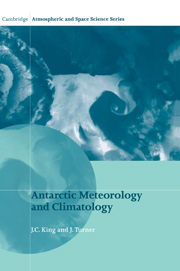Book contents
- Frontmatter
- Contents
- Preface
- Chapter 1 Introduction
- Chapter 2 Observations and instrumentation
- Chapter 3 Physical climatology
- Chapter 4 The large-scale circulation of the Antarctic atmosphere
- Chapter 5 Synoptic-scale weather systems and fronts
- Chapter 6 Mesoscale systems and processes
- Chapter 7 Climate variability and change
- Appendix A A chronological list of stations that have made multiyear meteorological observations in the Antarctic and on the sub-Antarctic islands
- Appendix B A chronological list of automatic weather stations that have been deployed in the Antarctic and on the sub-Antarctic Islands
- References
- Index
Chapter 3 - Physical climatology
Published online by Cambridge University Press: 02 December 2009
- Frontmatter
- Contents
- Preface
- Chapter 1 Introduction
- Chapter 2 Observations and instrumentation
- Chapter 3 Physical climatology
- Chapter 4 The large-scale circulation of the Antarctic atmosphere
- Chapter 5 Synoptic-scale weather systems and fronts
- Chapter 6 Mesoscale systems and processes
- Chapter 7 Climate variability and change
- Appendix A A chronological list of stations that have made multiyear meteorological observations in the Antarctic and on the sub-Antarctic islands
- Appendix B A chronological list of automatic weather stations that have been deployed in the Antarctic and on the sub-Antarctic Islands
- References
- Index
Summary
Radiation
Short-wave or solar radiation drives the general circulation of the atmosphere and the weather systems that are observed on a day-to-day basis. Most of this energy is absorbed in the tropics and mid-latitude areas, with the polar regions receiving much less as a result of the low angle of the sun at these latitudes. The high albedo (reflectivity) of the snow and ice surface also results in much of the incoming solar radiation being returned to space so that the fraction absorbed is much less than that which is absorbed in the extra-polar regions. Nevertheless, radiation is still extremely important in determining the surface energy budget and also affects many aspects of the climate of the Antarctic, including the nature of the low-level temperature inversion, the katabatic wind regime and the stability of the atmosphere. In this section we will examine the various components of the surface radiation budget and consider their climatological values at three contrasting sites in the Antarctic. These are Faraday Station (65.3° S, 64.3° W) on the Argentine Islands, Antarctic Peninsula, which represents a relatively northerly location. Halley (75.5° S, 26.6° W), a coastal station on the eastern side of the Weddell Sea and Vostok (78.5° S, 106.9° E) on the Antarctic plateau, which is one of only two interior stations with a reasonably long record of radiation measurements. The data for Faraday and Halley cover the period 1963–82 and are taken from Gardiner and Shanklin (1989) whereas the Vostok observations cover the period 1963–73 and are from Dolgina et al. (1976).
- Type
- Chapter
- Information
- Antarctic Meteorology and Climatology , pp. 68 - 141Publisher: Cambridge University PressPrint publication year: 1997
- 1
- Cited by



